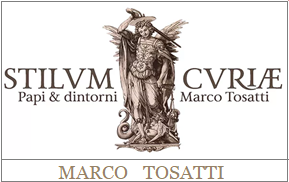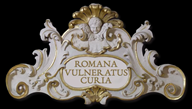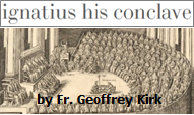 Some fallout generated from the pope's 'word of the year' for 2019, even if only a handful of commentators appear to have been provoked at all by the weight that the pope gives the concept. Like me, Christopher Ferrara's first associated the word with Freemasonry...
The deistic Christ?
Some fallout generated from the pope's 'word of the year' for 2019, even if only a handful of commentators appear to have been provoked at all by the weight that the pope gives the concept. Like me, Christopher Ferrara's first associated the word with Freemasonry...
The deistic Christ?
by Christopher Ferrara

January 17, 2019
In the Fatima Perspective I posted the day after Christmas, I commented on Pope Francis’s “Urbi et Orbi” Message for Christmas, wherein he refers to “the fraternity that Jesus Christ has bestowed on us” - by which he meant not the members of His Mystical Body united in one Lord, one Faith and one Baptism, but rather
all of humanity, “among persons of different religions”, the existence of which he declared to be “not a detriment or a danger; they are a source of richness.”
There must be, said Francis, not the unity of mankind in the one true Church, to which all men are called, but rather simply “fraternity among persons of diverse religions.”
On January 16, the One Peter Five website ran an important piece on how the Masons of the Grand Orient Lodge of Spain hailed Francis’s address precisely for its religious indifferentism, declaring:
“All the Masons of the world unite themselves to the petition of the Pope for ‘fraternity between persons of diverse religions’.”
As the Masons of Spain exulted:
“The words of the Pope show how far the Church has come from the content of Humanum Genus (1884), the last great Catholic condemnation of Masonry.” A reference to the landmark encyclical of Leo XIII, summing up the Church’s entire teaching against the errors of Freemasonry.
The Magisterium of the Catholic Church has condemned Freemasonry as a threat to true religion and the good order of civil society almost from the moment it emerged as an anti-religion with the unification of the four lodges of England into the Grand Lodge of London in 1717.
That anti-religion is preached as a lowest-common-denominator “religion in which all men agree” as followed in Masonic “temples”. Nothing has since come in for a greater number of Magisterial condemnations than “the sect of the Freemasons,” as Pope Leo called it in Humanum Genus.
The capital error of the Freemasons, Leo warned, is
“the great error of this age — that a regard for religion should be held as an indifferent matter, and that all religions are alike. This manner of reasoning is calculated to bring about the ruin of all forms of religion, and especially of the Catholic religion, which, as it is the only one that is true, cannot, without great injustice, be placed in a bundle with the others.” (In the Italian: in
un fascio con le altre, which has been altered in the English translation at Vatican.va to “merely equal to other religions.” The Italian corresponds better to the original Latin text: “
quae cum una ex omnibus vera sit…”]
The deity of the Masonic religion is not Christ, but the Great Architect of the Universe (G.A.O.T.U.), which can be any sort of deity a Mason imagines to exist, or no God at all but simply Nature, as Spinoza (excommunicated even by the synagogues of Holland) declared in his infamous equation of the two.
It would be facile to say merely that Francis has adopted the Freemasonic anti-religion. But
it would be dishonest to say that he is here defending the one true religion merely because he opines that the fraternity between men of all religions is “bestowed” by Christ.
What he has done, rather, is to suggest that Christ is the head of a Masonic-style pan-religious brotherhood in the sense that it is He who bestows “fraternity” upon the members of all religions. This the Masons would not do, as many of them are not even colorably Christian and even the most virulently anti-Christian atheists are welcome in the “temples” of Freemasonry.
But, by merely tacking Christ onto the Masonic idea of pan-religion, Francis effectively reduces Him to G.A.O.T.U., the distant God who does not command that anyone join any particular church, much less the Church that Christ, God Incarnate, founded as the sole ark of salvation and “purchased with His blood” (Acts 20:28).
The Christ who merely bestows fraternity from afar, making no specific religious demands on men, is a kind of deistic Christ whose bare existence does not interfere in the practice of any religion whatsoever, or no religion at all.
Thus the Spanish Masons are quite right to declare that Francis confirms “how far the Church has come from the content of Humanum Genus (1884)…” Which is to say,
how far the Church’s human element has wandered from the path of the Gospel, to which it seems only the most dramatic intervention of Heaven, under the mantle of Our Lady, can restore it.
With good reason did Leo conclude his resounding condemnation of Freemasonry with this i
nvocation of the intercessory power of the Virgin Mother of God: “Let us take as our helper and intercessor the Virgin Mary, Mother of God, so that she, who from the moment of her conception overcame Satan may show her power over these evil sects, in which is revived the contumacious spirit of the demon, together with his unsubdued perfidy and deceit.”
The Popes no longer speak this way. And that is why the Church is now in the midst of the worst crisis in her history, whose inevitable resolution will, however, constitute one of her greatest triumphs: the Triumph of the Immaculate Heart of Mary.
In her analysis, Marco Tosatti's contributor RVC does not bring up the Freemasons but yes, the French Revolution and Bergoglio's use of the brotherhood concept to push his and the UN's idea of global solidarity with migrants - epitomized by the Global Compact signed late last year, equality for the latter vis-a-vis citizens of the countries they are demanding to enter, and their freedom to do as they please.
On the pope's 'word of the year'
and what is being done in its name
Translated from

January 20, 2019
RVC has sent us a very interesting reflexion on the over-use of the word ‘brotherhood’ (fraternity) by the Vatican in recent days. Not that there is anything wrong with brotherhood per se – even if well-known examples (Cain and Abel, Romulus and Remus, Jacob and Esau, Joseph and his brothers, the prodigal son and his older brother) underscore howit is not always easy even for blood brothers to coexist without knifing each other. Here’s RVC:
 “I read Sandro Magister’s post in Settimo Cielo, and I find it most intriguing to attempt to interpret the position of the new editor of L’Osservatore Romano on the word-concept of brotherhood as the ‘Word of the Year’, as per Pope Francis himself. Which the OR even defines as ‘the new frontier of Christianity'.
“I read Sandro Magister’s post in Settimo Cielo, and I find it most intriguing to attempt to interpret the position of the new editor of L’Osservatore Romano on the word-concept of brotherhood as the ‘Word of the Year’, as per Pope Francis himself. Which the OR even defines as ‘the new frontier of Christianity'.
The word was spoken by the pope at least 12 times in his last Christmas Day urbi et orbi message.
But the word is closely linked to ‘equality’ and ‘freedom’ in the motto of the French Revolution. My own interpretation of the pope’s fraternity messasge is this: Brotherhood today signifies the universal solidarity of the UN’s Global Compact recently signed by the Vatican, which was made necessary by the equality that all migrants deserve, against which no one has the freedom to dissent.
Magister tells us the OR’s new editor announced that the first thing this pope wants to do is to ‘awaken from sleep’ that brotherhood which was so exalted by the French Revolution and which is now, for Bergoglio ‘the new frontier of Christianity’. But brotherhood, in the revolutionary sense, and according to the UN’s Charter of Human Rights inspired by Enlightenment principles, really reaffirms the Golden Rule which Jesus articulated as “Do to others whatever you would have them do to you.” (Mt 7,12).
Since we have become accustomed to having to interpret what this pope says, let us note that this evangelical definition of brotherhood is necessarily acceptable and indisputable. However, the OR editor appears to overlook the words equality and freedom which go hand in hand with brotherhood. In the pope’s thinking, equality, which in the Human Rights charter, means equal dignity among those who need help, doubtless means the equality of migrants to citizens of the countries they demand to enter. At this point, we see the sense of the papal urbi et orbi message.
But we should also interpret what he means by freedom in this context. The word was closely associated with the Reign of Terror under Robespierre who used it in the contrary sense, transforming it with his chilling addendum “but no freedom at all for the enemies of the revolution”. It allowed him to imprison some 300,000 dissidents or counter-revolutionaries, of which at least 30,000 were executed, sending to the guillotine even moderates like Danton, Lavoisier, Desmoulins.
Moreover, Robespierre, in order to pacify the moderates and the religious world, invented the ‘Supreme Being’ [a deism like that of the Freemasons’ Great Architect of the Universe] which proposed unity around an abstract social value – in this case, brotherhood.
But what has become of that brotherhood advocated by the French Revolution? Today it is universal brotherhood expressed as global solidarity with all migrants, namely, the Global Compact imposed by the UN and all its satellite agencies. It is not difficult to see how such brotherhood could well end up like that of Cain and Abel…
Fr Kirk has a different take altogether...
Fraternal advice

January 20, 2019
So now we know – for
L’Osservatore Romano has told us: the papal buzz word for 2019 is ‘fraternity’.
We can expect it to appear with predictable ubiquity in every allocution, every official document, every spontaneous intervention. ‘Fraternity’ will litter the homilies at the Santa Marta, and pepper every public audience.
But what – beyond banal generalities – does it mean?
Liberte, egalite, fraternite. Since the catchphrase was coined in 1789, it has had a chequered history.
Liberty has subsided into license, equality into envy, and fraternity into cliquishness (Francis’s word for that is ‘clericalism’).
In order to help us discern true fraternity, Andrea Monda, the new editor of
L’Osservatore Romano, has given us a geometrical analogy:
‘From this vision springs the image of the polyhedron, an image so dear to Pope Francis, which explains human complexity better than the flat and ideological image of the sphere.’ In truth, the Pope more frequently uses the analogy of the human family: ‘The experience of families teaches us this: as brothers and sisters, we are all different from each other. We do not always agree, but there is an unbreakable bond uniting us, and the love of our parents helps us to love one another’.
Both analogies are wide of the mark. The polyhedron is static and unchanging. The family can equally well be a source of enmity rather than unity. 69% of all crimes of violence are committed by one member of a family against another.
What Francis surely means is not ‘fraternity’ – the brotherhood of man – but
agape, the self-giving love of God.
‘This is love: not that we loved God, but that he loved us and sent his Son as an atoning sacrifice for our sins.' (I John 4:10)
It is common redemption, not mere biological propinquity, which makes of us radical moral demands to support, cherish and sustain each other.
[Modificato da TERESA BENEDETTA 22/01/2019 07:02]